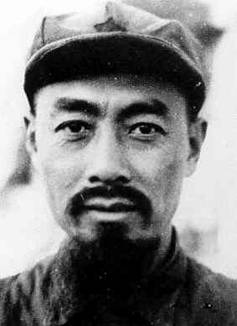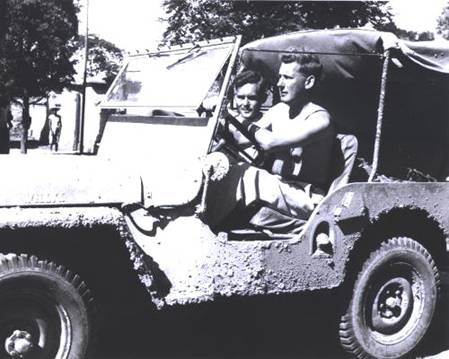|
China Memoir:
Encounters with Premier Zhou Enlai By Roy Rowan |
|
|
Zhou Enlai: An
Erudite Revolutionary |
Photo by Roy Rowan Roy Rowan as United Nations
Transportation officer in Henan Province of China, 1947. Claude Lievsay is in passenger seat of
their mud-spattered jeep. Note bullet
hole in lower left corner of windshield. |
|
By Roy Rowan My last two years of World War II
were spent in New Guinea and the Philippines. Perhaps it was the proximity of
those Pacific islands to the Chinese mainland that lured me there in early
1946. Mustering out of the Army as a 26-year-old major, I tried very hard to
land a job as a foreign correspondent in Shanghai. But too many experienced war correspondents
were already vying for jobs covering the civil war between Mao Zedong’s
Communists and Chiang Kai-shek’s Nationalists. Unable to land a reporter’s job, I
signed on with the United Nations Relief and Rehabilitation Administration – UNRRA as
it was called –
as a transportation specialist, hoping to write freelance articles in my
spare time. Within a few months I found myself in Kaifeng, then capital of
Henan Province on China’s Central Plain between the Yellow and Yangtze
Rivers. There I was given 400 U.S. Army war surplus trucks and 700 Chinese
drivers and mechanics. My assignment was to supply the war-devastated
villages in that region with food, clothing, and farm tools. Because the ancient mud-walled
communities changed hands so often it was hard to tell which were occupied by
the Communists and which by the Nationalists. The roads were a worse problem.
Never intended for motor vehicles, they had been worn into existence by a
2,000-year procession of ox carts, mule carts, and wheelbarrows. To keep our
trucks from being commandeered by either Mao’s or Chiang’s troops, another
American and I would frequently escort our convoys across the bleak no-man’s
land between the two armies. One day in 1947 without warning our
UNRRA headquarters in Kaifeng found itself playing host to Brigadier General
Zhou Enlai, the man destined to become Communist China’s Premier. Mao, he
reported, was infuriated by our failure to supply a fair percentage of the
relief supplies to the Communist villages. After delivering an angry ultimatum
he softened up and agreed to spend the night in our truck compound. I was surprised during dinner how
urbane and witty the man was. Lively dark eyes pierced out from under heavy
eyebrows. When he smiled, which he did frequently, long vertical furrows
creased his cheeks. A scraggly beard adorned his chin, though I’d heard he
shaved it off from time to time to keep from being recognized by Chiang’s
secret police, who had put an $80,000 price tag on his head. At breakfast the next morning Zhou
regaled us with stories about the early days of the civil war. He described
the ordeal of the Communists’ legendary, six-thousand-mile Long March to the
safe haven of Yanan in the mountainous northwest. The two-year-trek in
1933-4, he related, had taken the Red Army through the opium country of
Guizhou, Sichuan, and Yunnan, where he said, “poppy fields bloomed pastel
pink. Everyone smoked,” he confessed. “Even babies were put to sleep sucking
on sugar cane covered with opium dust.” It would be 25 years before I met
Zhou again. In 1972 I became Hong Kong bureau chief for Time magazine.
Although President Nixon’ s much-heralded meeting with Mao that year had
supposedly opened the way for “journalistic exchanges” with the Peoples
Republic, American reporters still weren’t welcome. Then in February, 1973, I
learned that Ethiopian Airlines was planning an inaugural flight from Addis
Ababa to Beijing, to be led by Emperor
Haile Selassie’s granddaughter, Her Imperial Highness Ida Desta. I had once
interviewed the emperor. “No harm wiring him to see if I could hitch a ride
to Beijing,” I decided. A few days later I was on my way. The logistics proved more complicated
than I expected. First I had to fly to Bombay, and pick up a connecting
flight to Addis, where a special Chinese visa was issued, then backtrack to
Bombay on the new Ethiopian Airline, which finally flew non-stop to Beijing – or would
have if bad weather hadn’t forced the plane to put down in Guangzhou. So
after sixty-three hours and 1165 miles of flying I finally landed in China,
exactly 111 miles from my starting point in Hong Kong. Finally arriving in Beijing our
entourage was invited to a reception in the Great Hall of the People. There
we were welcomed by none other than my old acquaintance, Premier Zhou Enlai,
filling in for the ailing Mao. It was said that “the suave premier could put
a cosmopolitan face on Communism,” which he soon demonstrated. Starting with
Princess Ida, Zhou moved from table to table, toasting and shaking hands with
each guest. Suddenly, there he was, the
double-barreled boss of China’s domestic and foreign policy, extending his
hand to me. “Your Excellency,” I heard myself say, “I have something for
you.” Then I handed him a gift-wrapped photo album of pictures I had taken in
1947 while convoying UNRRA supplies to Communist-held villages in Henan. “Do
you remember meeting me there?” I asked. Zhou looked perplexed, reluctant to
take my gift as if I were offering him some kind of cumshaw. His
interpreter came to his rescue, politely accepting the package. A minute later China’s deputy foreign
minister rushed to our table and asked the meaning of my bad behavior,
offering a gift to His Excellency. No breach of protocol, I assured him. My
only purpose was the hope that the old photos of Henan might elicit an
invitation to revisit the province. “That’s not possible,” snapped the deputy
foreign minister. “You have to submit a written request to the Foreign
Journalists’ Association.” Every six months
for the next eight years I dutifully did that, almost certain nothing would
come of it. Then to my amazement in 1981 an invitation from Beijing arrived
by mail. By that time I was a senior writer for Fortune based in New
York. For the next month, with my wife Helen and a Chinese government
“guide” (spy), I revisited and re-photographed the old villages. A government
trained nurse followed in a car behind in case we got sick. The roads were
now paved and the ancient protective mud walls around the towns torn down.
Otherwise, everything looked the same. But creeping capitalism encouraged by
Zhou Enlai, I discovered, was already making small inroads on the Communist
way of life. And that was the story I wrote for Fortune. Roy Rowan spent 35
years as a foreign correspondent, writer, and editor for Time, Life, and Fortune.
He is the author of eight books, including Chasing the Dragon: A Veteran Journalist’s Firsthand Account of the Chinese Revolution,
that has been optioned by Hollywood. |
|

